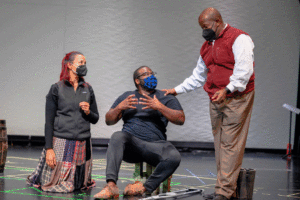Professor of Historical Musicology Elizabeth Keathly felt pretty well-versed in opera history, a topic she’d been teaching for at least fifteen years, when a trio of students stoked her curiosity and turned the tables on who was doing some of the learning:
“Shonda Devine, Amon Neely, and Charles Williamson knew so much about Black opera that I didn’t know, and I started thinking, ‘Why isn’t this in the repertoire? Why isn’t this in the textbooks?’ That same semester we had a colloquium guest, Horace Maxille, a music theorist, and part of his presentation included excerpts from Anthony Davis’s X: The Life and Times of Malcolm X (premiered 1986 at New York City Opera), and I remember thinking there is clearly an issue here about representation and equity.”
That was ten years ago. Keathley says as her study and exploration continued, she realized there is an entire American opera tradition that most people know nothing about.
Fast-forward to 2022. As Keathley plans for retirement, she is also preparing her swan song— “Black Identities on the Operatic Stage: A Symposium with Music,” which will be on the UNCG campus on Saturday, March 26th:
“I want to do my part to bring the best scholars of Black opera to Greensboro so we can all learn more about this important American tradition, and to bring singers and pianists in concert to share a sampling of these works to the public. In doing so, I wish to honor the Black composers, singers, impresarios, and poets who made it happen.”
The symposium features research that reveals Black opera in a variety of ways including the role of Black opera managers, the significance of dance, operas by Black women composers, and the intersection of Black opera and politics. The keynote speaker, Naomi André, is the foremost authority on Black opera and will discuss the significance of this particular moment in Black opera history. The recital features local and guest singers from the Southeast and UNCG collaborative pianists performing works by Joseph Bologne, the Chevalier de Saint-Georges; William Grant Still; Tania León; Rosephanye Powell; Regina Baiocchi; and others.
Keathley believes opera provides a tremendous opportunity to address inequities in the arts:
“With its compelling narratives, staging, music, and, above all, beautiful singing, the power of opera to move our souls is unparalleled among the arts. When this rich medium is deployed to carry socially progressive messages, as in Nkeiru Okoye’s opera Harriet Tubman: When I Crossed That Line to Freedom, or Terence Blanchard’s Champion, you have to be pretty damn resistant not to take those messages to heart.”
Keathley notes those who have worked toward social change from the opera stage and behind the scenes:
“Opera has historically been aligned with elites, from the nobles and royalty who commissioned the first operas to the billionaires who fund the Metropolitan Opera. But there is also a long history of artists and their supporters who have pushed against that elitism, including Eleanor Roosevelt who made it possible for Marian Anderson to sing at the Lincoln Memorial after the Daughters of the American Revolution declined her request to sing at Constitution Hall, and who helped found New York City Opera, whose explicit goal was to stage more diverse operas for more diverse audiences. William Grant Still’s premiere of Troubled Island, about the Haitian revolution—the first successful revolt of enslaved people in the Western hemisphere—was staged there in 1949, and other operas by Black composers have subsequently premiered there (later Marian Anderson became the first African American to sing at the Met).”

This season, the Metropolitan Opera reopened to post-pandemic audiences with two Black operas on the schedule—Fire Shut Up In My Bones by Terence Blanchard, and George Gershwin’s Porgy and Bess:
“What I take from that is our official institutions are finally catching up to what’s been going on all along. I love the Met because its singer and production values are so fine, but they have pretty much ignored the Black opera that has been going on all this time. I should add that the Met has also pretty much ignored operas composed by women of any ethnicity.”
What Keathley also points out about those productions is that the casts included three UNCG Opera alumni—and one of them was none other than Charles Williamson, one of the students who started her research on Black opera in the first place. Williamson, Kevin Gardner and Lindell Carter were in Porgy and Bess; Gardener was in the cast of Fire Shut Up In My Bones:
“They came to UNCG with a lot of talent and ability. I think their ‘value added’ at UNCG was additional experience in productions. I love seeing our alumni’s names on the program! I love and admire them individually, but it’s also a great point of pride that we nurture such talent here at UNCG.”
For more information about the full schedule of events and how to register, visit vpa.uncg.edu/music/black-identities-on-the-operatic-stage-symposium/
Acknowledgements:
Keathley acknowledges her collaborator Kristen Turner (’89 BM Oboe Performance) who is an Adjunct Professor of Musicology at North Carolina State University as being crucial to the project. She also thanks partners across campus for support of this project: the School of Music; Weatherspoon Art Museum; the African American and African Diaspora Studies Program; the Lloyd International Honors College; the Women’s Gender, and Sexuality Studies Program; and the Office of Research and Engagement. Thanks also go to off-campus sponsor Oden Brewing Company.
Story by Terri W. Relos